“So, here’s the big question: If diplomacy is the only rational solution to this problem yet the Iranians just want nukes — in other words, if there is no deal (or at least no deal that the United States would realistically offer) that would compel them to give up their dream — what’s the next step?” Slate‘s Fred Kaplan admits to being stymied on the troubling question of Iranian nukes.
Category: World at Large
Hidden Costs.
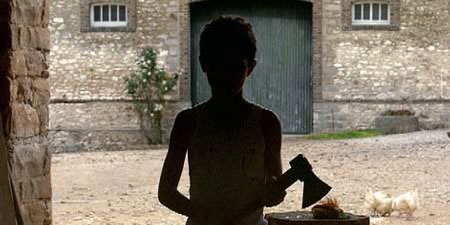
The second half of last night’s double-feature, Michael Haneke’s Cache, offered a moral universe in many ways diametrical to that of Match Point — here, even the long-buried sins of the upper crust are eventually exposed before the Great Eye. As I said in the 2005 round-up, last year was a banner year for politically-minded movies, and Cache, both an unsettling thriller of personal surveillance and a timely rumination on First World comforts and complicity in an age of terror, definitely ranks among them. With its inordinately protracted (and sometimes intentionally confusing) shots and its refusal to answer many of the questions it poses (including the plot device driving the film), Cache isn’t going to be everyone’s cup of tea, and I’m sure some will write it off as just a pretentious and inscrutable foreign film. Nevertheless, I thought Cache was well worth seeing. It’s a film that, both visually and politically, will put you ill at ease.
Cache begins with a long, steady image of a Parisian street, held throughout the very slowly typed-out credits and beyond. Well after the normal amount of time our movie-conditioned eye allots for a basic establishing shot (by now, Tony Scott would have had an embolism), the image is suddenly paused, and then rewound. As it turns out, we’ve been viewing a tape, one featuring –and sent to — the home of the Laurents, along with a scrawled picture of a child vomiting blood. (Yes, it starts like Lost Highway, but they’re very different movies.) Georges (Daniel Auteuil), the host of his own popular Charlie Rose-ish television show, is nonplussed by this bizarre tape, and his wife Anne (Juliette Binoche), a successful book agent, is driven to distraction, particularly as more cassettes (with more information) arrive, and it becomes increasingly clear that Georges has some sense of why this is happening. Soon, for the sake of his wife and 12-year-old son Pierrot (Lester Makedonsky), Georges is forced to follow the path prescribed by these strange missives, and to confront a dark moment in his past that he, his parents, and arguably his nation have purposefully forgotten.
What that dark moment is is for you to discover, although it’s one that (as political analogy — it doesn’t work quite as well in terms of straight narrative) hearkens to the French-Algerian conflict and, more broadly, the war on terror and the hidden costs and benefits of colonialism. Georges rages and fumes throughout the movie, insisting over and over that he and his family are being terrorized. But by whom, and for what? Is Georges really blameless, and, that question aside, are his responses appropriate? Some very brief flashes of didacticism aside (for example, the scene involving CNN), Cache generally posits troubling questions about national memory, the dividends of empire, and the state of the world today without telling us how to feel about them.
Another layer of unease in the film involves the aforementioned camerawork. Cache returns to that exterior view of the Laurents’ home several times, and we never know if we’re watching “just” an establishing shot or indulging in the stalker’s-eye-view. (The likely answer, a la Rear Window, is that we’re doing both.) This goes for almost every scene in the film, and the cumulative experience of “stalking” the Laurents for two hours adds to the apprehension and foreboding of Cache. We begin to feel complicit in this crime of surveillance, just as, in time, we come to feel complicit in the Laurents’ sins. (Sure, the question of “the gaze” is a hoary staple of any Film 101 class — still, Haneke manages here to move past arthouse histrionics and create something that feels genuinely creepy.)
Finally, as I said above, Cache is disarmingly open-ended, particularly by the “explain-everything-several-times” standard we’re used to. Yes, one character’s arc is made clear, I think, by his/her womb-like retreat from the world, and that maddening last shot, if you caught the action (screenshot spoilers here), does suggest a possible answer to the cassette issue. But, ultimately, the bullet-points of the thriller story aren’t all that important. The plot mechanics of Cache may remain hidden, but the unsettling impressions of guilt and complicity it leaves linger in plain sight.
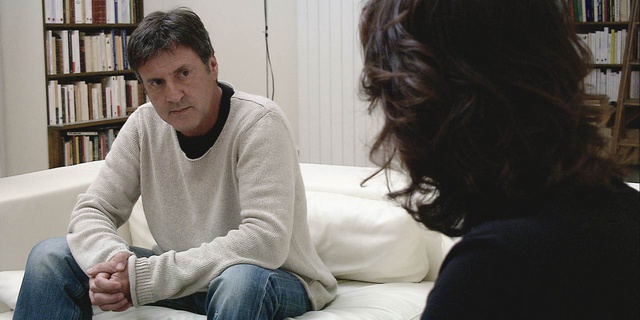
Point of No Return.
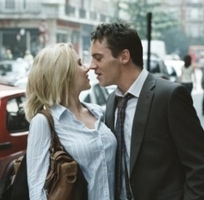 It’s a good time to live in New York: Not only are the Knicks suddenly playing winning basketball again, but Match Point is, as rumored, a return to form for that consummate Manhattanite (and unabashed Knicks fan), Woody Allen. Mining the same misanthropic vein as Crimes and Misdemeanors, the movie nevertheless feels — aside from a few nods to Allen’s usual high-culture influences and the occasional Annie Hall-ish quirk by Emily Mortimer — unlike anything Woody’s done in years. Gone are the Upper East Side setpieces (we’re in London this time) and that quintessential Allen stammer. (Heck, Ewan Bremner, a British Allen analogue if there ever was one, is in this movie and even he’s not doing it.) Instead, we’re left with an increasingly dark amorality play about ambition, adultery, and the considerable, if not terrifying, role of blind luck in organizing the universe.
It’s a good time to live in New York: Not only are the Knicks suddenly playing winning basketball again, but Match Point is, as rumored, a return to form for that consummate Manhattanite (and unabashed Knicks fan), Woody Allen. Mining the same misanthropic vein as Crimes and Misdemeanors, the movie nevertheless feels — aside from a few nods to Allen’s usual high-culture influences and the occasional Annie Hall-ish quirk by Emily Mortimer — unlike anything Woody’s done in years. Gone are the Upper East Side setpieces (we’re in London this time) and that quintessential Allen stammer. (Heck, Ewan Bremner, a British Allen analogue if there ever was one, is in this movie and even he’s not doing it.) Instead, we’re left with an increasingly dark amorality play about ambition, adultery, and the considerable, if not terrifying, role of blind luck in organizing the universe.
Unfortunately, Match Point suffered from one of those three-minute summary-type trailers. If you’ve seen it, you probably already know more than you want about the story. If you haven’t, here’s the abbreviated version: Chris Wilton (Jonathan Rhys Meyers, more believable as a tortured soul than a romantic lead), a former tennis pro who gives lessons at the club by day and reads Dostoevsky by night, befriends Tom Hewett (Matthew Goode) one of his more dissolute upper-crust students, and, over opera and cocktails, wins the heart of Tom’s sister Chloe (Emily Mortimer). Soon, with his good graces and acquired cultural literacy, Chris has managed to seduce the whole Hewett family, including Tom and Chloe’s father (Brian Cox, surprisingly not chewing the scenery) and mother (Penelope Wilton, surprisingly — to me — not chewing on flesh.) But, trouble arises in the second set when Chris meets a kindred spirit in Tom’s fiancee, the vampish American Nola (Scarlett Johansson, better-than-usual). Soon, Chris finds himself laying his new life on the line in order to get closer to Nola, with potentially disastrous results…
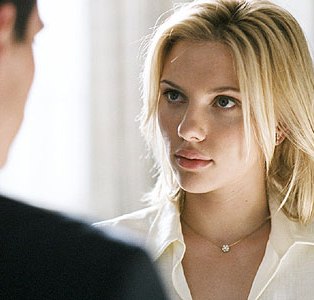 As the paragraph above attests, Match Point is in part a tale of scheming class climbers skulking about London’s higher social echelons, a conceit that still paid dividends in Henry James’ day but may seem relentlessly dated now, at least as it’s presented by Allen. And, indeed, what with the high-culture name-drops (Strindberg, Sophocles) and all the old-money accoutrements favored by the Hewetts, this often seems like London by way of Merchant-Ivory more than any real place on the globe. But, I think this stylization is forgivable, particularly since, ultimately, Woody is hunting bigger quarry than class and its pretensions anyway. Giving away the details of the third act would be a crime, but Allen aficionados won’t be surprised to find that Chris eventually finds himself wrangling with an — or the — existential dilemma. And it’s with this final act that the film itself leaps a notch and joins the upper ranks of Allen’s oeuvre. Who knows? Perhaps Woody just got lucky this time. After all, chance favors the prepared mind…or are we all just fortune’s fools?
As the paragraph above attests, Match Point is in part a tale of scheming class climbers skulking about London’s higher social echelons, a conceit that still paid dividends in Henry James’ day but may seem relentlessly dated now, at least as it’s presented by Allen. And, indeed, what with the high-culture name-drops (Strindberg, Sophocles) and all the old-money accoutrements favored by the Hewetts, this often seems like London by way of Merchant-Ivory more than any real place on the globe. But, I think this stylization is forgivable, particularly since, ultimately, Woody is hunting bigger quarry than class and its pretensions anyway. Giving away the details of the third act would be a crime, but Allen aficionados won’t be surprised to find that Chris eventually finds himself wrangling with an — or the — existential dilemma. And it’s with this final act that the film itself leaps a notch and joins the upper ranks of Allen’s oeuvre. Who knows? Perhaps Woody just got lucky this time. After all, chance favors the prepared mind…or are we all just fortune’s fools?
Just Like Tom Thumb’s Blues.
Greetings from NYC, where Berk and I returned yesterday evening. I’ve been spending today running errands and generally cleaning up the apartment environs for 2006, but I expect updates should return to normal around here shortly.
Red Letterman Day.
“I’m not smart enough to debate you point to point on this, but I have the feeling, I have the feeling about 60 percent of what you say is crap.” Along the lines of (2006 Oscars host) Jon Stewart on Crossfire in 2004, a driven-to-anger David Letterman goes after guest Bill O’Reilly on Cindy Sheehan, the war in Iraq, and his “fair and balanced” drivel. “I agree to you, with you that we have to support the troops. They are there, they are the best and the brightest of this country…however, that does not eliminate the legitimate speculation and concern and questioning of ‘Why the Hell are we there to begin with?’” (Via Dumbmonkey.)
You remind me of the power.
Who do? You do. The eerie new teaser for Guillermo Del Toro’s Pan’s Labyrinth, a sequel of sorts to Cronos and The Devil’s Backbone, is now online. (Click through the ad.)
The Lessons of Munich.
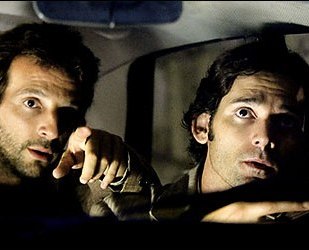 If at times somewhat turgid, Steven Spielberg’s Munich, which I caught this afternoon, is a lively and admirable piece of filmmaking. For the most part, it works as both an expertly-told cloak-and-dagger thriller and a timely rumination on the moral consequences and violent blowback that accompany vengeance as an anti-terror policy. (Indeed, the film infuses Spielberg’s dramatic strengths with contemporary gravitas much more smoothly and profoundly than this summer’s War of the Worlds, which, like Tom Cruise’s earlier Collateral, seemed like it’d be a better movie until taking a tremendously ill-conceived jag in the second hour.) Still, while Munich is assuredly a very good film, ultimately I think the gears grind a bit too loudly at times to consider it a great one.
If at times somewhat turgid, Steven Spielberg’s Munich, which I caught this afternoon, is a lively and admirable piece of filmmaking. For the most part, it works as both an expertly-told cloak-and-dagger thriller and a timely rumination on the moral consequences and violent blowback that accompany vengeance as an anti-terror policy. (Indeed, the film infuses Spielberg’s dramatic strengths with contemporary gravitas much more smoothly and profoundly than this summer’s War of the Worlds, which, like Tom Cruise’s earlier Collateral, seemed like it’d be a better movie until taking a tremendously ill-conceived jag in the second hour.) Still, while Munich is assuredly a very good film, ultimately I think the gears grind a bit too loudly at times to consider it a great one.
After a chilling retelling of the horrible events that forever marred the 1972 Olympics (told mostly through newsfootage at first, with reenactment filling in the details later on) and a grim strategy session presided over by Golda Meir (Lynn Cohen), the film introduces us to Avner (Eric Bana), the family man-cum-Mossad agent assigned to head one of Israel’s deep-undercover response teams. Comprised of embittered wheelman Steve (Daniel Craig), nebbishy bombmaker Robert (Matthieu Kassovitz), resigned forger Hans (Hanns Zichler), and conflicted clean-up man Carl (Ciaran Hinds), Avner’s team crisscrosses various scenic European vistas, clumsily dealing death to the alleged perpetrators of the Munich tragedy. (One would think an assassination squad that included James Bond, Julius Caesar, and the Hulk wouldn’t have as much trouble as they do here.) But as the (terrorist and collateral) body count piles up and Avner’s hunters become the hunted, these agents of vengeance increasingly question the righteousness of their retribution, and wonder whether the costly murders they’ve perpetrated have made any dent in the war against Black September.
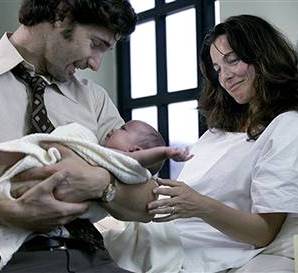 The acting in Munich is universally good, with special marks going to Bana and his colleagues, particularly as their early relish for the job shades into reluctance and, eventually, paranoia and abject horror. (Mathieu Amalric and Marie-Josee Croze are also memorable as a French information dealer and Dutch assassin respectively.) And, for most of the film, Spielberg’s direction is exquisite. Still, sadly, there are some flaws — The pacing of Munich noticeably lags in the middle hour. And, more troubling, the film seems to strain visibly at times to seem arty and high-minded. For every few import-laden scenes executed with a deft touch (for example, the sequence in which Avner’s team shares a safehouse with a PLO cell), there’s one where the symbolism seems just a tad inflated. (Particularly egregious in this regard is the, ahem, climax, which intercuts the Munich massacre with scenes of a tortured-looking Avner having sex with his wife. What, exactly, does this mean? Are love and war meant to seem oppositional or synchronous? Is this union the “home” that Israel must protect, or what? Whatever the intended message, the scene comes across as not only opaque but overblown.)
The acting in Munich is universally good, with special marks going to Bana and his colleagues, particularly as their early relish for the job shades into reluctance and, eventually, paranoia and abject horror. (Mathieu Amalric and Marie-Josee Croze are also memorable as a French information dealer and Dutch assassin respectively.) And, for most of the film, Spielberg’s direction is exquisite. Still, sadly, there are some flaws — The pacing of Munich noticeably lags in the middle hour. And, more troubling, the film seems to strain visibly at times to seem arty and high-minded. For every few import-laden scenes executed with a deft touch (for example, the sequence in which Avner’s team shares a safehouse with a PLO cell), there’s one where the symbolism seems just a tad inflated. (Particularly egregious in this regard is the, ahem, climax, which intercuts the Munich massacre with scenes of a tortured-looking Avner having sex with his wife. What, exactly, does this mean? Are love and war meant to seem oppositional or synchronous? Is this union the “home” that Israel must protect, or what? Whatever the intended message, the scene comes across as not only opaque but overblown.)
Still, not to miss the forest for the trees, Munich is a movie well worth-seeing, the rare thriller that’s not afraid to grapple with today’s thorniest political questions, and without insulting the audience’s intelligence by giving easy, simple-minded answers to seemingly insoluble problems. The film may at best be a long triple, but, to his credit, at least Spielberg is swinging for the fences.
Apocalypto Now.
“Every time I think I’m going to wake up back in the jungle…” The strange teaser for Mel Gibson’s Mayan epic Apocalypto is now online. Looks intriguing, although to be honest — with the Will Durant quote, Chichen Itza, rainforest scouting, and the panther attack — I had a hard time watching this and not thinking of Civ 4. Update: Look for the subliminal Mel…bizarre.
No Transit.
The MTA strike has begun. As I’m ensconced uptown and have completed most of my christmas shopping, the strike doesn’t much affect me yet, although picking up my rental car for the drive home in the HOV-restricted zone of Manhattan might turn out to be a pain…we’ll see.
Thick & Thin.
In the trailer bin, Steve Coogan breaks the fourth wall (again) — and gets his Scully on — in the trailer for Michael Winterbottom’s Tristam Shandy: A Cock-&-Bull Story, and Christian Bale gets uber-skinny (again) with Steve Zahn for Werner Herzog’s Vietnam movie Rescue Dawn.
